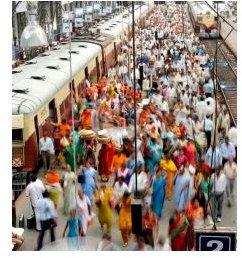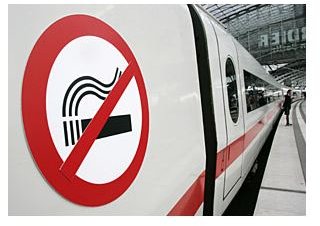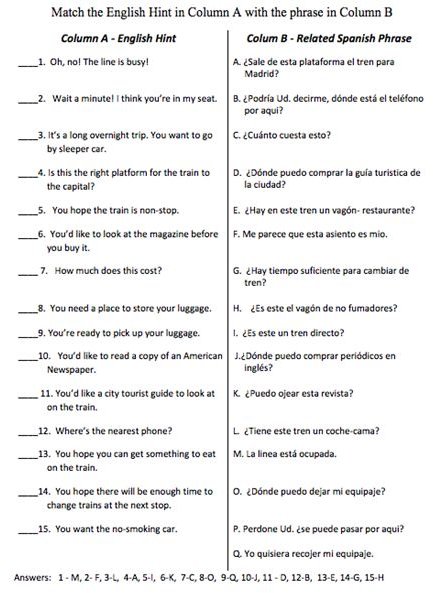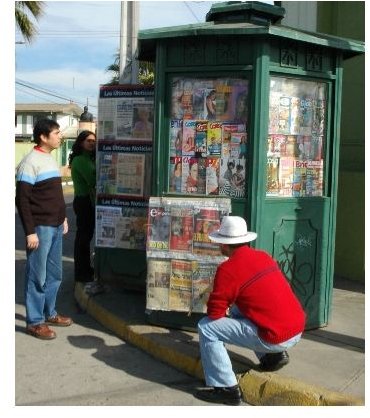Spanish Vocab Directions and Travel Phrases Used in Train Stations
Spanish Phrases for Use in the Train Station
The specialized Spanish phrase list that follows is for the traveler passing through the train station. It includes a variety of situations the tourist will encounter checking luggage, finding English language newspapers and magazines, using the telephone, getting information at the ticket office, and while traveling on the train. The list is adaptable to classroom role playing by students, who could either be the tourist asking the questions, or the ticket agent or good Samaritan in the train station answering the questions.
1. Storing your luggage (Dejar el equipaje)
- Where can I put my luggage? – ¿Dónde puedo dejar mi equipaje?
- Where are the luggage lockers? – ¿Dónde están las consignas automáticas?
- I’d like to leave my luggage. -- Yo quisiera dejar mi equipaje.
- How much does it cost per hour? – ¿Cuánto cuesta por una hora?
- I’d like to leave the luggage until 11 o’clock. – Yo quisiera dejar mi equipaje hasta las once.
- I want to collect my luggage. – Yo quisiera recojer mi equipaje.
- Where are the luggage carts? -- ¿Dónde están los carritos para el equipaje?
- That is my suitcase. – Esta es mi valija.
2. At the Newsstand (Al quiosco de periódicos)
Where can I buy a newspaper in English? _\-- ¿Dónde puedo comprar periódicos en inglés?_
- Where can I buy a town guidebook? – ¿Dónde puedo comprar la guía turistica de esta ciudad?
- I would like this magazine. – Yo quisiera esta revista.
- I would like a pocket dictionary. – Yo quisiera un diccionario de bolsillo.
- I would like a map of the city. – Yo quisiera un mapa de la ciudad.
- Can I look at this magazine? – ¿Puedo hojear esta revista? or ¿Puedo ver esta revista?
- How much does this cost? – ¿Cuánto cuesta esto?
3. Using the telephone (Usar el teléfono)
- Can you tell me where the nearest phone is? -- ¿Podría Ud. decirme, dónde está el teléfono por aqui?
- May I use your telephone? – ¿Puedo hacer una llamada de su teléfono?
- I would like to make a call to __________. – Quiero hacer una llamada a _____.
- Could you talk more slowly? – ¿Podría Ud. hablar más despachio?
- We’ve been disconnected. – Nos han cortado.
- The line is busy. – La linea está ocupada.
- There is no answer. – No contesta.
4. Buying your ticket and getting information about the trip (Comprar un tiquete; pedir información)
-

-
How much is a ticket to_______? – ¿Cuánto cuesta un ticket (un tiquete) a_____?
-
Is this a non-stop train? – ¿Es este un tren directo?
-
Are there any additional charges? – ¿Tengo que pagar recargo?
-
Do I have to change trains? -- ¿Tendré que cambiar de tren?
-
Is there enough time to make the connection? – ¿Hay tiempo suficiente para cambiar de tren?
-
Does this train stop at _______? – ¿Hace este tren parada en ___________?
-
Is there a restaurant car on this train? – ¿Hay en este tren un vagón-restaurante?
-
Is there a sleeping car on this train? – ¿Tiene este tren un coche-cama?
-
Does the train to ___________ leave from this platform? – ¿Sale de esta plataforma el tren para ____________?
5. Traveling by train (Viajar por tren)

- Where are the second class cars? – ¿Dónde se encuentra la segunda clase?
- Excuse me. May I get by? – Perdone Ud. ¿se puede pasar por aqui?
- Is this car for non – smokers? -- ¿Es este el vagón de no fumadores?
- Excuse me, is this seat free? – Perdone Ud. ¿está libre este asiento?
- I think this is my seat. – Me parece que esta asiento es mio.
- Would you mind helping me? – ¿Podría Ud. ayudarme?
- Could you let me know when we get to __________? – ¿Podría Ud. avisarme cuándo lleguemos a _________.
- When does the train for _________ leave? – ¿Cuándo sale el tren a ____________?
- Which platform does the train from _______ come into? – ¿A qué plataforma llega de _________?
- When does this train arrive at ________? – ¿Cuándo llega este tren a _________?
- How long does this train stop here? – ¿Cuánto tiempo para aqui?
Suggested Classroom Activities
Conversational Practice
The foregoing Spanish phrases provide a good opportunity for classroom skits and conversational practice. Students can work in pairs or groups and compose answers to the questions listed above. One method would be to parcel out one or two questions from each section and have the students compose their dialog for a short skit in front of the class.
Matching Quiz
Consider adding a phrase matching quiz (based on the above) to a regularly scheduled quiz. (See the suggested matching quiz below.)

Downloadable Phrase List and Matching Quiz
Download the phrase list and matching quiz from the public media gallery at Spanish Travel Phrases for Use at the Train Station.
This post is part of the series: Teaching Spanish: Spanish Travelers’ Phrases for Conversational Practice
Spanish phrases offer an excellent opportunity for student conversational practice using questions and answers, etc. This series features situational conversational practice in various travel environments (at the airport, etc.). Vocabulary handouts and suggested matching quizzes are included.
